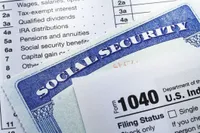Social Security Benefits and Your Taxes: 6 Things to Know for 2026
Will the IRS take a bite of your Social Security benefits this year? From the new 'senior bonus' deduction to calculating 'provisional income,' here are six key points to know.


Profit and prosper with the best of Kiplinger's advice on investing, taxes, retirement, personal finance and much more. Delivered daily. Enter your email in the box and click Sign Me Up.
You are now subscribed
Your newsletter sign-up was successful
Want to add more newsletters?
Social Security is a vital source of income for millions of people. However, when it comes to taxes on Social Security benefits, confusion and misinformation often come into play.
One common misperception is that Social Security benefits are entirely tax-free. However, it has been the rule for many years that some portion — in some cases, up to 85% — of your Social Security benefits can be taxable, depending on your income.
This system can have major implications for retirement planning since the tax calculation involves not only income from Social Security but also other common sources of retirement income like pensions, investments, and tax-exempt interest. (More on that below).
From just $107.88 $24.99 for Kiplinger Personal Finance
Become a smarter, better informed investor. Subscribe from just $107.88 $24.99, plus get up to 4 Special Issues

Sign up for Kiplinger’s Free Newsletters
Profit and prosper with the best of expert advice on investing, taxes, retirement, personal finance and more - straight to your e-mail.
Profit and prosper with the best of expert advice - straight to your e-mail.
So, understanding how your Social Security benefits are taxed is important for navigating your financial future and making informed decisions to enhance your overall security in retirement.
Taxes on Social Security income
To get you started, here are five things to know about the ins and outs of taxes on Social Security.
1. Is Social Security taxable?
First, some, but not all of your Social Security benefits are subject to tax. The portion of your benefits that may be taxable varies since it depends on your income.
The IRS uses a tiered system based on “combined income.” (Combined income is your adjusted gross income plus nontaxable interest and half of your Social Security benefits from the year.)
The net amount of Social Security benefits you receive is reported in Box 5 of your Social Security benefit statement (Form SSA-1099).
According to the IRS, your benefits may be taxable if the total of your combined income is greater than the base amount for your filing status.
Combined Income | Social Security Tax Amount |
|---|---|
Under $25,000 (single) or $32,000 (joint filing) | No tax on your Social Security benefits |
Between $25,000 and $34,000 (single) or $32,000 and $44,000 (joint filing) | Up to 50% of Social Security benefits can be taxed |
Above $34,000 (single) or above $44,000 (joint filing) | Up to 85% of benefits can be taxed. |
*Single includes single, head of household or qualifying widow or widower
- If your combined income is under $25,000 (single) or $32,000 (joint filing), there is no tax on your Social Security benefits.
- For combined income between $25,000 and $34,000 (single) or $32,000 and $44,000 (joint filing), up to 50% of benefits can be taxed.
- With combined income above $34,000 (single) or above $44,000 (joint filing), up to 85% of benefits can be taxed.
Base amounts for the different filing statuses are:
- $25,000: For single, head of household, or qualifying surviving spouse
- $25,000: For married filing separately and lived apart from your spouse for the entire year
- $32,000: Married filing jointly
- $0 if you're married, filing separately, and lived with your spouse at any time during the tax year. (This means you will likely pay taxes on your benefits.)
Note: If you're married and file a joint return, you and your spouse must combine your income and Social Security benefits when figuring out the taxable portion of your benefits. That’s true even if your spouse didn't receive any benefits.
It's also a common misconception that tax rules for Social Security apply only to retirement benefits. But benefits from Social Security trust funds, including survivor and disability benefits, are subject to tax rules. However, Supplemental Security Income (SSI) payments are not taxable.
The IRS provides an online tool to help you determine how much, if any, of your Social Security income is taxable.
2. Income matters more than retirement age for SS taxes
You can see from the tiered system how much your income matters. However, there are a lot of misconceptions about Social Security benefits becoming tax-exempt when recipients reach a certain age. Notably, a common question on Google is at what age are Social Security benefits no longer taxed?
In fact, it's mostly your income and filing status (not your age) that determine whether you pay income taxes on your benefits — and how much.
For more information, see Do You Stop Paying Taxes on Social Security at a Certain Age?
3. How to ask for Social Security withholding

If you are worried about owing taxes on your Social Security benefits, you can choose to have federal taxes withheld from your monthly Social Security payments. By having taxes withheld, you prepay a portion of your tax bill.
The withholding options are 7%, 10%, 12%, or 22% of your benefits. You can select this option when you apply for Social Security or by completing and submitting IRS Form W-4V.
If you prefer, you can also make quarterly estimated tax payments to cover anticipated tax liability.
- Making estimated payments may be preferable if you have variable sources of income or need payment flexibility.
- These payments might also be better suited for those with higher total tax liability or who want to maximize their monthly Social Security benefits.
- On the other hand, withholding from your Social Security check might be preferred if you like automatic deductions and have relatively predictable income.
For more information, see Kiplinger's report: Withholding Taxes From Your Social Security Benefits.
4. How the Social Security COLA affects your tax bill
The taxes on Social Security can be impacted by the cost-of-living adjustment (COLA). COLA increases can cause some recipients to move into a higher federal income tax bracket — particularly when inflation is high, as it has been for the last few years.
- The Social Security COLA for 2024 was 3.2%. That was a significant drop from the previous year's COLA of 8.7%, the highest COLA in over 40 years.
- What about 2025? The Social Security COLA for 2025 is 2.5%.
This more modest increase reflects the cooling inflation trend from the last few months. Though a lower increase can bring financial hardship for some, there could be some tax benefits to consider.
For more information, see Four Tax Benefits of a Lower Social Security COLA.
5. Which states tax Social Security benefits
Social Security benefits are not taxed in most states, but for 2026, eight states still tax Social Security benefits. (That's three states down from last year.)
Those states include Colorado, Connecticut, Minnesota, Montana, New Mexico, Rhode Island, Utah, and Vermont. As Kiplinger has reported, Utah might soon eliminate its Social Security tax.
Note: New Mexico technically taxes Social Security benefits, but many retirees won’t pay a dime to the state at tax time. That’s because legislation passed last year provides higher income thresholds for exempting Social Security benefits.
Some state criteria for determining income tax are more generous than the federal government's. That can mean higher income thresholds (as in the case of New Mexico) or higher deductions and exemptions that can lower the tax burden for taxpayers.
6. Did the New Trump tax bill end Social Security taxes?
The 2025 Trump/GOP tax reform bill (often referred to by President Donald Trump as the "big beautiful bill") is frequently touted by the Trump administration as ending taxes on Social Security.
But it's important to know that the 2025 tax law does not repeal the taxes on Social Security benefits. Instead, it has introduced a new $6,000 Senior Bonus Deduction ($12,000 for married couples) that could effectively reduce or eliminate tax burden for some retirees.
- For some middle-income eligible older adults, the new senior deduction will be larger than the taxable portion of their Social Security.
- This means that while your benefits might still be technically taxable on paper, your final tax liability on those benefits could potentially drop to zero.
However, higher-income retirees with significant 401(k) withdrawals or investment income may still find that up to 85% of their benefits are subject to tax. That's in part because the $6,000 bonus begins to phase out once your adjusted gross income exceeds $75,000 (single) or $150,000 (joint).
For more information, see our report: How the New $6,000 Senior Bonus Deduction works.
Taxes on Social Security benefits: Bottom line
Knowing how Social Security and taxes work is vital to making informed financial decisions in retirement. Since Social Security benefits can have tax implications, it's important to plan to avoid surprises.
It's also important to know how the IRS taxes common types of retirement income so that you can develop a tax-efficient strategy for your retirement years. Seeking the advice of a trusted tax professional can help as well.
Read More
- Seven Ways to Reduce Taxes on Your Social Security Benefits
- Withholding Taxes From Your Social Security Benefits
- New Bill Would End Taxes on SS Benefits in 2026
Profit and prosper with the best of Kiplinger's advice on investing, taxes, retirement, personal finance and much more. Delivered daily. Enter your email in the box and click Sign Me Up.

Kelley R. Taylor is the senior tax editor at Kiplinger.com, where she breaks down federal and state tax rules and news to help readers navigate their finances with confidence. A corporate attorney and business journalist with more than 20 years of experience, Kelley has helped taxpayers make sense of shifting U.S. tax law and policy from the Affordable Care Act (ACA) and the Tax Cuts and Jobs Act (TCJA), to SECURE 2.0, the Inflation Reduction Act, and most recently, the 2025 “Big, Beautiful Bill.” She has covered issues ranging from partnerships, carried interest, compensation and benefits, and tax‑exempt organizations to RMDs, capital gains taxes, and energy tax credits. Her award‑winning work has been featured in numerous national and specialty publications.
-
 4 High-End Experiences Worth the Splurge After 50
4 High-End Experiences Worth the Splurge After 50These curated date ideas provide the perfect backdrop for couples ready to enjoy the very best that the world has to offer.
-
 Health Care Stocks Have Sagged. Can You Bet on a Recovery?
Health Care Stocks Have Sagged. Can You Bet on a Recovery?The flagging health care sector has perked up a bit lately. Is it time to invest?
-
 Costco's Auto Program: Can Membership Pricing Really Save You Money on a Car?
Costco's Auto Program: Can Membership Pricing Really Save You Money on a Car?Costco's Auto Program can simplify the car-buying process with prearranged pricing and member perks. Here's what to know before you use it.
-
 4 High-End Experiences Worth the Splurge After 50
4 High-End Experiences Worth the Splurge After 50These curated date ideas provide the perfect backdrop for couples ready to enjoy the very best that the world has to offer.
-
 My Grandkids Want Me to Donate to Their Teams and School Fundraisers. I Adore Them, but I'm on a Budget.
My Grandkids Want Me to Donate to Their Teams and School Fundraisers. I Adore Them, but I'm on a Budget.When your heart says "yes" but your wallet says "no," there is still a way forward. Here's what financial pros say.
-
 Quiz: Do You Know How to Maximize Your Social Security Check?
Quiz: Do You Know How to Maximize Your Social Security Check?Quiz Test your knowledge of Social Security delayed retirement credits with our quick quiz.
-
 2026 Tax Refund Delays: 5 States Where Your Money Is Stuck
2026 Tax Refund Delays: 5 States Where Your Money Is StuckState Tax From New York to Oregon, your state income tax refund could be delayed for weeks. Here's what to know.
-
 It's Time to Bust These 3 Long-Term Care Myths (and Face Some Uncomfortable Truths)
It's Time to Bust These 3 Long-Term Care Myths (and Face Some Uncomfortable Truths)None of us wants to think we'll need long-term care when we get older, but the odds are roughly even that we will. Which is all the more reason to understand the realities of LTC and how to pay for it.
-
 How One Extra Dollar of Income Can Cost You Thousands in Retirement
How One Extra Dollar of Income Can Cost You Thousands in RetirementRetirement Even modest changes in retirement income can raise Medicare premiums under IRMAA. Here’s how a small increase can affect your retirement costs.
-
 Aging in Place Can Be Bad for Your Health: This Financial Pro's Alternative Is a No-Brainer
Aging in Place Can Be Bad for Your Health: This Financial Pro's Alternative Is a No-BrainerWhy age alone in financial hardship when you can enjoy companionship — and share the costs of housing, groceries and health care — with a small community of friends?
-
 First the Penny, Now the Nickel? The New Math Behind Your Sales Tax and Total
First the Penny, Now the Nickel? The New Math Behind Your Sales Tax and TotalRounding Tax A new era of "Swedish rounding" hits U.S. registers soon. Learn why the nickel might be on the chopping block, and how to save money by choosing the right way to pay.
